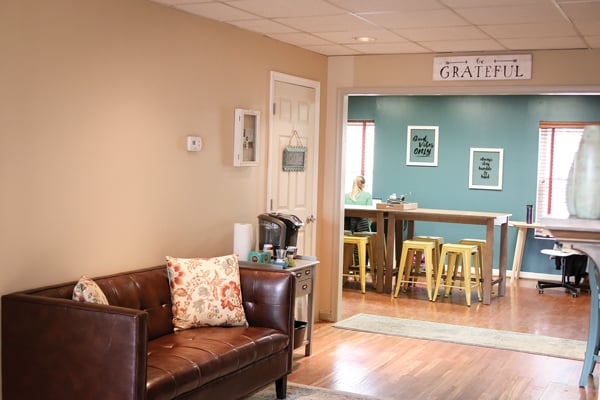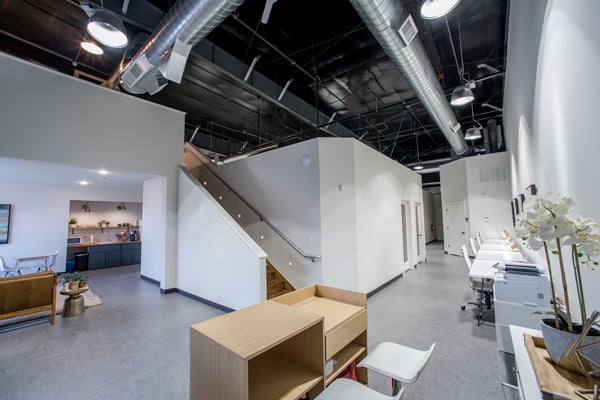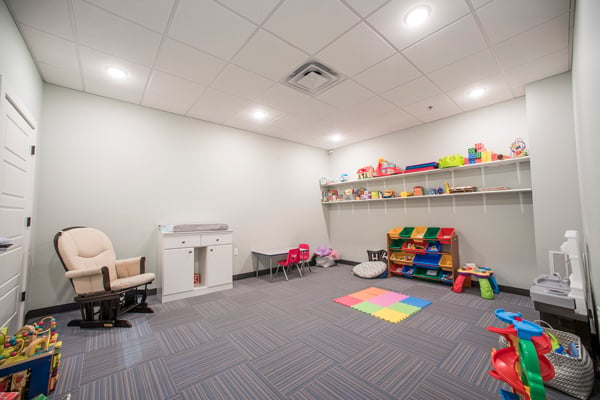Coworking Spaces With Child Care Services

A new type of coworking center is emerging to meet the needs of parents with part-time or flexible work schedules and child care needs.
THE GROWTH OF the coworking model is well-documented. As the trend continues to take hold, more spaces are catering to specific demographics, such as women, or industry sectors, such as tech startups and scientists. The latest subpopulation to be targeted by coworking spaces is parents, particularly working moms and dads, through on-site child care.
Jobs and child care mirror each other; a child must be cared for while a parent is at work, making work and child care schedules dependent on one another. But in the age of the sharing economy and virtual work, jobs have changed in ways that are challenging the current structure of child care. Workers are increasingly undertaking “gigs” rather than full-time positions, while child care largely remains on the full-time, regular schedule of the past. In fact, many parents intentionally pursue part-time, flexible work to spend more time with their children or to keep one foot in the workplace. With child care costs continuing to rise and wages continuing to stagnate, parents have even more incentive to reduce their consumption of child care.
Coworking spaces with on-site child care are emerging as an innovative way to make the child care routine more efficient, convenient and cost-effective. Moonlighting moms and dads can stop taking calls at naptime and cobbling together babysitting; now they can go to one location where their children will be cared for while they work on a more flexible, customizable schedule.
Different Approaches
Child care is a highly regulated industry that varies tremendously from state to state. The type of child care offered by a coworking space depends on its location and what regulatory path the operator has opted to take. Many spaces offer child care that is exempt from state licensing standards as long as children attend no more than a certain number of hours per day; three or four hours is most common. This exemption was designed to enable parents to engage in short-term activities, such as in a mall or gym.
Nido: Durham, North Carolina. One of the first coworking spaces with on-site child care to emerge in the United States was Nido, which means “nest” in Italian. Demonstrating the link between work habits and child care needs, founder Tiffany Frye came up with the idea in 2013 when her employer allowed her to work remotely from home after she had a baby. What started at her house as a co-op of women, who alternated working on laptops with watching the kids, has evolved into a coworking space with an on-site Montessori child care program in a 2,000-square-foot house zoned for commercial purposes.
Nido currently operates as an exempt child care program for children ages 4 months to 5 years with a limit of four hours per day and offers half-day (four hour) packages. Parents can sign up for two, three or five half-days of combined coworking and child care per week, to be used on whatever days they choose, at a cost of approximately $200 per month for one half-day a week.


Play, Work or Dash in Tysons, Virginia, offers both coworking space and a supervised playroom where parents can leave their children for up to three hours per day. Photos by Jessica Scharpf
Work and Play: South Orange, New Jersey. Deborah Engel, founder of Work and Play, conceived of her coworking space when she struggled with going back to work after her second child arrived. She quit her job and researched her idea. She found that a lot of New York City executives in the New Jersey suburbs were working remotely and that parents were looking for flexible child care just like she was. “There were lots of people trying to stay [involved in] their children’s daily lives while continuing to work.”
With the help of an investor, Engel bought a dilapidated building in South Orange’s downtown and fully renovated it. Town officials, who saw the space as an economic development tool that would drive foot traffic downtown, helped Engel navigate a morass of zoning and code issues as she overhauled the unique space. Engel designed a 1,525-square-foot coworking environment as well as a 1,000-square-foot child care space capable of meeting state child care regulations.
Work and Play opened in February 2015. New Jersey permits only two hours per day of child care for exempt programs, so Engel quickly pursued licensure. Since December 2016, Work and Play has offered a fully licensed early childhood program with customizable schedules for infants up to 6 year olds. Members can “choose how many days a week [their] child comes, as well as how many hours, [ranging] from two hours to six hours per day.” Coworking rates range from $75 for 15 hours to be used over a three-month period to $275 per month for an “all access” plan, while childcare costs an additional $15 to $16.50 per hour.
While approximately 18 percent of Engel’s members use both coworking and child care, the majority (59 percent) use only coworking and the remaining 23 percent use only child care. Work and Play has experienced so much demand for its coworking space that it has already rented additional private offices down the street.
Play, Work or Dash: Tysons, Virginia. Nicole Dash had owned a home-based day care business in northern Virginia for nearly a decade when she decided families in her program needed more support. “I realized that I needed to help parents too, so the whole family could achieve better work-life balance.” She rented a 1,500-square-foot townhouse office space in December 2015 and designed a coworking space geared toward working parents.
Dash set up the same high-quality child care she had developed in her previous business on the lower level and designed a shared office space upstairs. The coworking space is homey and relaxed; it feels as if you are in your living room while a playdate is going on in another wing of the house. In January 2018, Play, Work or Dash expanded to the 1,700-square-foot space next door to offer more private offices, a larger play space and other amenities such as a private call room, making its total footprint 3,200 square feet.
The vast majority of members are parents whose children use the playroom, which operates as an exempt child care space with a three-hour limit, per Virginia regulations. Although Dash encourages her customers to sign up a half-hour ahead, as long as there is space in the play area, parents can drop in whenever they need. Play, Work or Dash accepts children from 9 months to 8 years and allows parents of children ages 2 and older to drop off their children while they run an errand or go to an appointment as long as they are no more than 30 minutes away from the space.
Marcia Sheehan, director of Play, Work or Dash, says the company’s users value the reliability of the child care. “Our members know we’re always here – many of them actually first discover us when their babysitters cancel or they have a family emergency.” For a mid-range package, which allows users to access coworking and child care for 24 hours a month, 90-minute passes cost about $20 each ($320 per month). Rates vary depending on whether passes are purchased in advance, as part of a package, or a la carte.
The Hatchery: Columbia, Missouri. Amanda Quick was inspired by a multiuse space in the St. Louis area that hosted classes, a restaurant and on-site child care. Since her home city of Columbia lacked a coworking space, she decided to establish one with child care as an amenity. The Hatchery opened in July 2017 with an exempt child care program that children between the ages of 6 weeks and 6 years can attend for up to four hours a day, per Missouri regulations.


Coworking parents can leave their children at The Hatchery in Columbia, Missouri’s child care space for up to four hours a day. Photos by Drew Piester Photography
The space offers a spa-like environment that uses open, white spaces to remove the distractions common at a coffee shop or home so members can focus and work efficiently. Quick enjoys networking and career coaching; members can look to Quick’s team and other members for guidance. While only 17 percent of her members use the child care space, Quick allows parents to purchase hours of child care as an add-on to any of the monthly coworking packages. Coworking rates range from $20 per day to $179 per month for unlimited use. The most popular child care package costs $400 for 80 hours.
The Challenges of a New Business Model
Entrepreneurs looking to open a coworking space with child care often experience roadblocks because third parties do not understand their business model. Frye, who now mentors others planning to open new spaces, says, “For instance, insurance folks don’t understand what we’re talking about. One of my mentees said an insurer would cover child care but wouldn’t take on adults being in the space too. [Insuring coworking with child care] requires the way liabilities are defined [to] be totally rewritten.” Quick also encountered doubt when she looked for a loan: “One bank told us that the coworking would be too disrupted by the kids. We ultimately used a bank that better understood our vision.”
Furthermore, child care licensing standards were not designed for the coworking model. Licensure often relies on structural and code-level building design that is not easily met by a space suitable for coworking. For example, licensure requires an outdoor play space, ample parking and several bathrooms and sinks in particular locations. “The space needs are different, functionally as well as aesthetically. You need to achieve the modern aesthetic of a coworking space – you can’t just design it as a day care [facility],” Frye says. Although Nido is not licensed, Frye reiterates that its program meets as many of North Carolina’s licensing guidelines as possible and, in many cases, exceeds them. “Some of the licensing requirements are unnecessary in a setting where parents regularly check in on their kids and are involved in their care,” Frye explains. In Virginia, there are additional requirements associated with being fully licensed. Dash says she would need to hire a professional, full-time educational director, an onerous cost for a small business.
Adding Value by Connecting Like-Minded People
Coworking with child care largely caters to women who are both their children’s primary caregiver and entrepreneurs, a role known as “mompreneurs” in the blogosphere. It thus connects people facing the same challenges. When these working moms meet, they instantly relate and want to help each other succeed. “We have accountants, web designers, editors, et cetera, who all offer their services to our small business owners,” explains Dash.
Networking groups like Femworking and Charmed Cardinals, which focus on supporting the unique needs of female entrepreneurs, also meet at Play, Work or Dash. Similarly, the Mom Owned Business Group, a networking and accountability group for mom business owners, meets monthly at Work and Play. Quick says that members of The Hatchery who are “certified in self-care techniques like Reiki, massage and empowerment coaching offer their services to other members.” Moreover, just having other “coworkers” to commiserate with about work as well as parenthood provides members with emotional support.
It is just the beginning for these innovative spaces. Steve King, president of Emergent Research, which closely tracks the growth of coworking spaces, estimates that among the more than 4,000 facilities in the U.S., only around 25 to 30 currently offer on-site child care. However, he says they are “popping up at a rapid clip right now.” Some examples of new or upcoming spaces are The Inc. in Seattle, MOMentum Coworking outside of Philadelphia, Workafrolic in Washington, D.C., and Third Space Coworking + Childcare in Omaha, Nebraska.
Camille Galdes (camille.galdes@gmail.com) is an urban policy writer and researcher.


